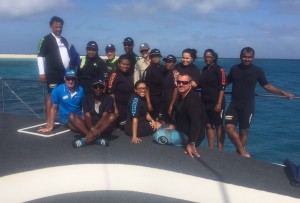Coral Reefs around the world are facing increasing pressures, from natural pressures such as climate change and severe weather events, to man-made pressures from tourism, transport and infrastructure. While different countries have different priorities when it comes to the health and sustainability of their reef ecosystems, one thing they all have in common is the need for management strategies to protect these vital ecosystems. Recently, Passions of Paradise hosted a group of international coral reef managers in an effort to showcase our variety of different sustainable practices. Journeying out to the reef is always an eye opening experience; however, for these international visitors, it was a chance to see some of the world’s best sustainable tourism management practices in action.
On Tuesday, June 16th, Passions of Paradise hosted Drs Paul Marshall and Adam Smith from Reef Ecologic, a group specialising in the design, implementation, management and review of Aquatic Reserves and Marine Protected Areas in Australia. Reef Ecologic also train reef managers from around the world in methods to better monitor and protect their reef sites. A group of 15 international coral reef managers from Samoa, Vanuatu, Grenada, Maldives, Jamaica and Fiji were selected to attend a fellowship program in an effort to display sustainable reef practices. The participants learned how Passions of Paradise utilises the Great Barrier Reef Marine Park Authority’s Eye on the Reef program to monitor health, our program to monitor and cull Crown-of-Thorns Starfish at our sites, and how our various briefings and information sessions create a cohesive experience with a consistent environmental message.
During the two in-water session, participants undertook training in the Great Barrier Reef Marine Park Authority’s Rapid Monitoring Program, and conducted a survey which acted as a snapshot of the reef health at that particular site at that time. Portions of this survey include a 10-minute timed swim designed to allow participants to tally the numbers of several key species at the location, 20 minutes conducting a benthic survey in an area with a 5 metre radius, which allows participants to access percentages of live coral and coral impacts, and a segment where participants can report any bleached coral, coral predation and disease, and rubbish or other impacts. Especially interested in this survey was Mr Roland Baldeo from the Grenada Fisheries Division, as he currently is developing tools in his home country to monitor reef health and fish stocks. Mr Baldeo is particularly interested in how to engage local communities and fishermen into volunteering their time to help conduct reef management surveys.

